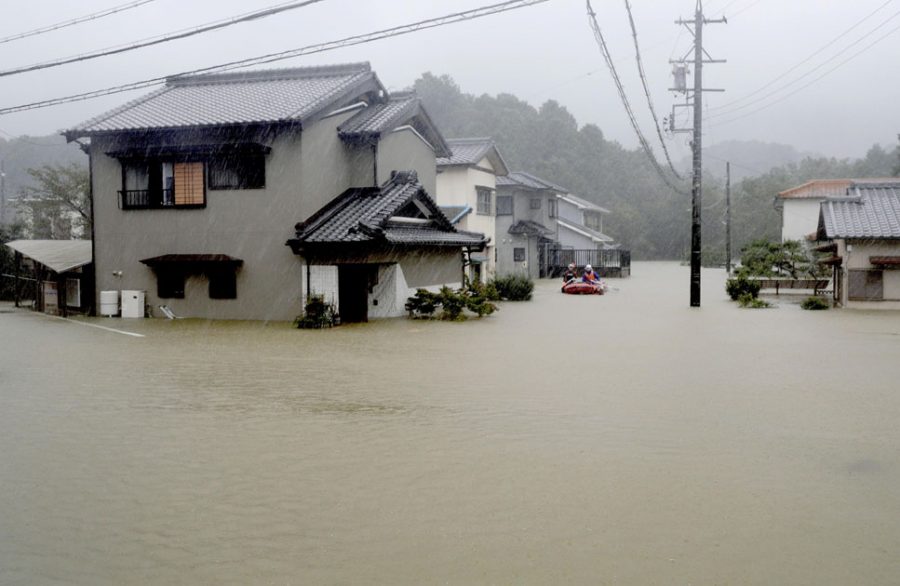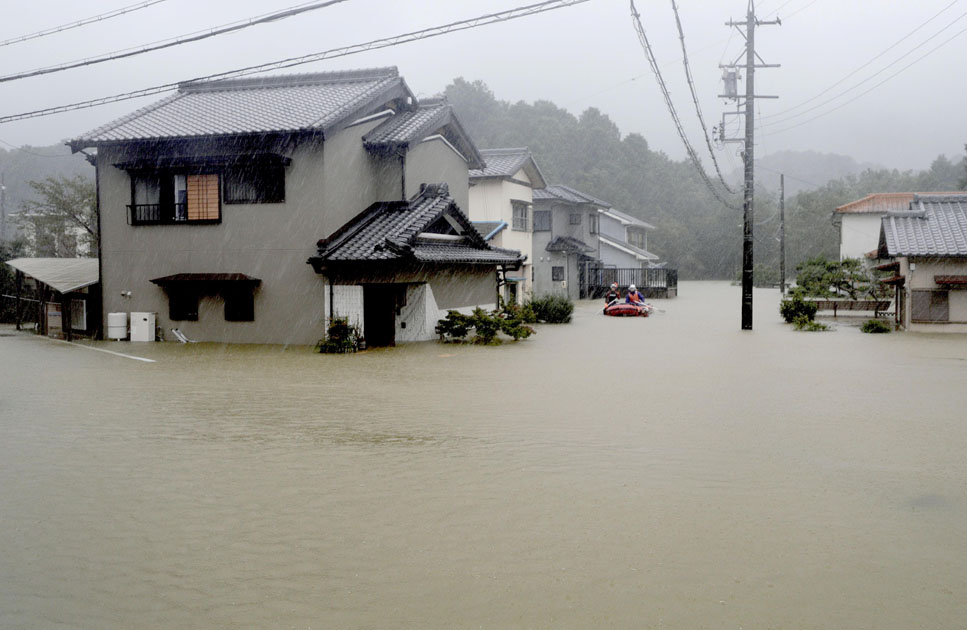
Typhoon Hagibis PHOTOS: 2 Killed as Worst Storm in 60 Years Hits Japan, Millions Advised to Evacuate
TOKYO – Two men were killed, over 60 people were injured and more than six million people were advised to evacuate Tokyo in Japan as a powerful typhoon bore down on the Japanese capital on Saturday, bringing with it the heaviest rain and winds in 60 years. (UPDATED 16h30 SA time from 1 fatality to […]

TOKYO – Two men were killed, over 60 people were injured and more than six million people were advised to evacuate Tokyo in Japan as a powerful typhoon bore down on the Japanese capital on Saturday, bringing with it the heaviest rain and winds in 60 years. (UPDATED 16h30 SA time from 1 fatality to 2, and 30 injures to 60.)




As all eyes are on Japan, where the Rugby World Cup is currently being held, Typhoon Hagibis is threatening to flood low-lying Tokyo as it coincides with high tide. Typhoon Hagibis, which means “speed” in the Philippine language Tagalog, made landfall on Japan’s main island of Honshu late on Saturday.
The storm, which the government warned could be the strongest to hit Tokyo since 1958 when over a thousand people were killed, has already brought record-breaking rainfall in Kanagawa prefecture south of Tokyo with a whopping 700 mm (27.6 inches) of rain over 24 hours.





The Japan Meteorological Agency issued the highest level of warning for some areas in Tokyo, Kanagawa and five other surrounding prefectures, warning of amounts of rain that occur only once in decades.
“We are seeing unprecedented rain,” an agency official told a news conference carried by public broadcaster NHK. “Damage from floods and landslides is likely taking place already.”
Many people in and around Tokyo were already taking shelter in temporary evacuation facilities.
TOKYO VULNERABLE TO FLOODING
Tokyo’s Haneda airport and Narita airport in Chiba both stopped flights from landing and connecting trains were suspended, forcing the cancellation of more than a thousand flights, according to Japanese media.






Kanagawa prefecture officials said they would release water from the Shiroyama dam, southwest of Tokyo, and alerted residents in areas along nearby rivers.
Heavy winds have already caused some damage, particularly in Chiba east of Tokyo, where one of the strongest typhoons to hit Japan in recent years destroyed or damaged 30,000 houses a month ago.
A man in his forties was killed in an overturned car in the prefecture early on Saturday. Another man died after a landslide destroyed two houses in a town in eastern Japan, with several still reported missing, according to NHK. Others were injured as winds blew roofs off several houses.






A number of municipal governments issued evacuation advisories to areas particularly at risk of floods and landslides, including some in the most populous Tokyo region.
Experts warned that Tokyo, while long conditioned to prepare for earthquakes, was vulnerable to flooding.
Tokyo, where 1.5 million people live below sea level, is prone to damage from storm surges, Nobuyuki Tsuchiya, director of the Japan Riverfront Research Center, told Reuters.
“We are heading toward high tide. If the typhoon hits Tokyo when the tide is high, that could cause storm surges and that would be the scariest scenario,” he said. “People in Tokyo have been in a false sense of security.”
More than 60,000 households have lost power, including 14,900 in Chiba, which was hit hard by typhoon Faxai a month ago, the industry ministry said.
The Defence Ministry set up a new Twitter account to disseminate information on disaster relief efforts.
Stores, factories and subway systems have been shut down as a precaution, while Japanese Formula One Grand Prix organizers canceled all practice and qualifying sessions scheduled for Saturday. Makeshift accommodation has been made for spectators.

Two matches of the Rugby World Cup due to be played on Saturday were also historically canceled, the first time in the Rugby World Cup’s history that matches have been cancelled.
Typhoon Ida, known as the “Kanogawa Typhoon” in Japanese, killed more than 1,200 people in 1958.
(Reporting by Makiko Yamazaki and Kiyoshi Takenaka; Editing by Paul Tait & Shri Navaratnam)
Japan are showing real dedication to training! #TyphoonHagibis #RWC2019 #bbcrugby pic.twitter.com/WwfyrH7Ikm
— BBC Rugby Union (@bbcrugbyunion) October 12, 2019
https://twitter.com/alfieatthelse/status/1182900126550908928
Some jobs don’t stop for anything. Spare a thought for the policemen of Tokyo today #TyphoonHagibis #RWC2019 pic.twitter.com/DKcW6u9NPb
— Kirstie Stanway (@KirstieStanway) October 12, 2019
https://twitter.com/TwitterMoments/status/1182896681769005057
